Essential results of international scientific workshop: The thought of K. Marx on distributive justice and its present significances
The thought of K. Marx on distributive justice is an achievement of human
thought history. It struggled against social inequity, defended human rights as well as
the needs, the conditions and opportunities of human development in various activities
of social life. At present, when the fast economic development of countries in the world
is sometimes accompanied by social injustices and inequalities, the problem of social
justice in general and distributive justice in particular must be seriously raised again.
The international workshop “The thought of K. Marx on distributive justice and its
present significances”, held in 17-18 May 2017 by Institute of Philosophy (Vietnam
Academy of Social Sciences) together with Friedric Ebert Foundation (Representative
Office for Vietnam) and Rosa Luxemburg Foundation (Representative Office for East
Asia) at Buôn Mê Thuột city, Đắk Lắk province, was to confirm scientific values and
practical significances of the K. Marx’s thought on distributive justice, to interpret the
problems of implementing distributive justice in the countries of the world and in
Vietnam, finding the positive solutions corresponding to Vietnam. This paper generalizes
the essential contents of the workshop.
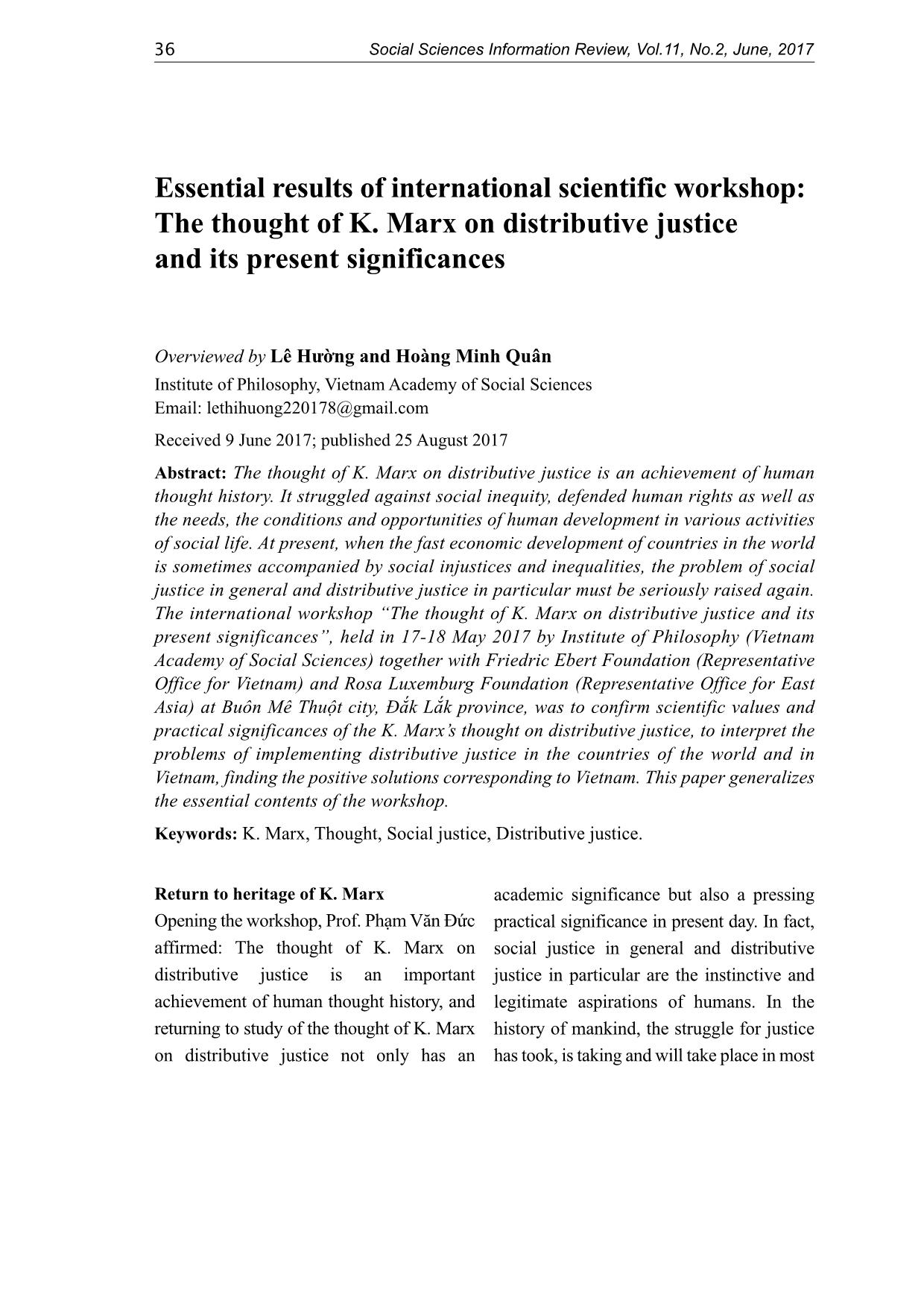
Trang 1
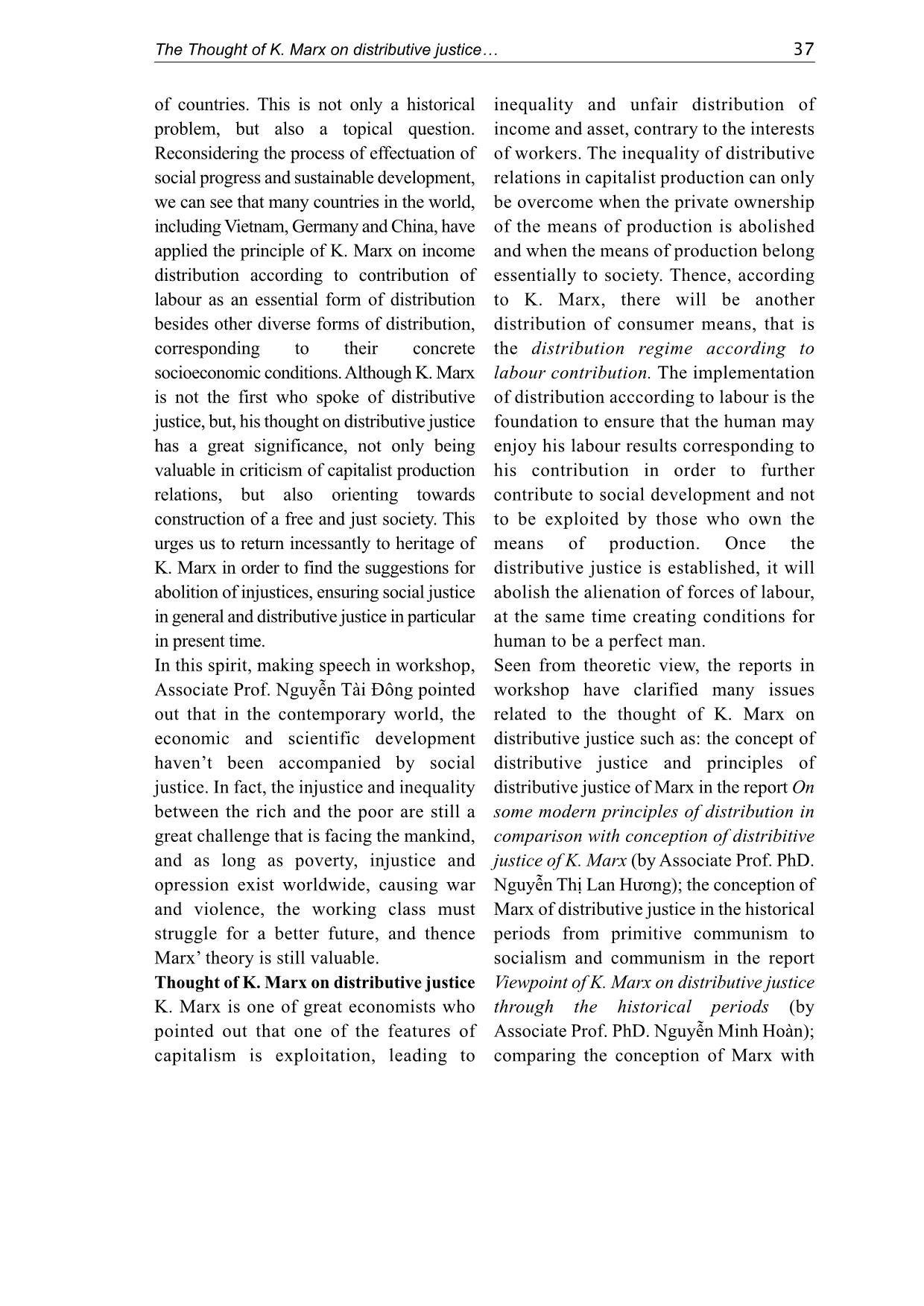
Trang 2
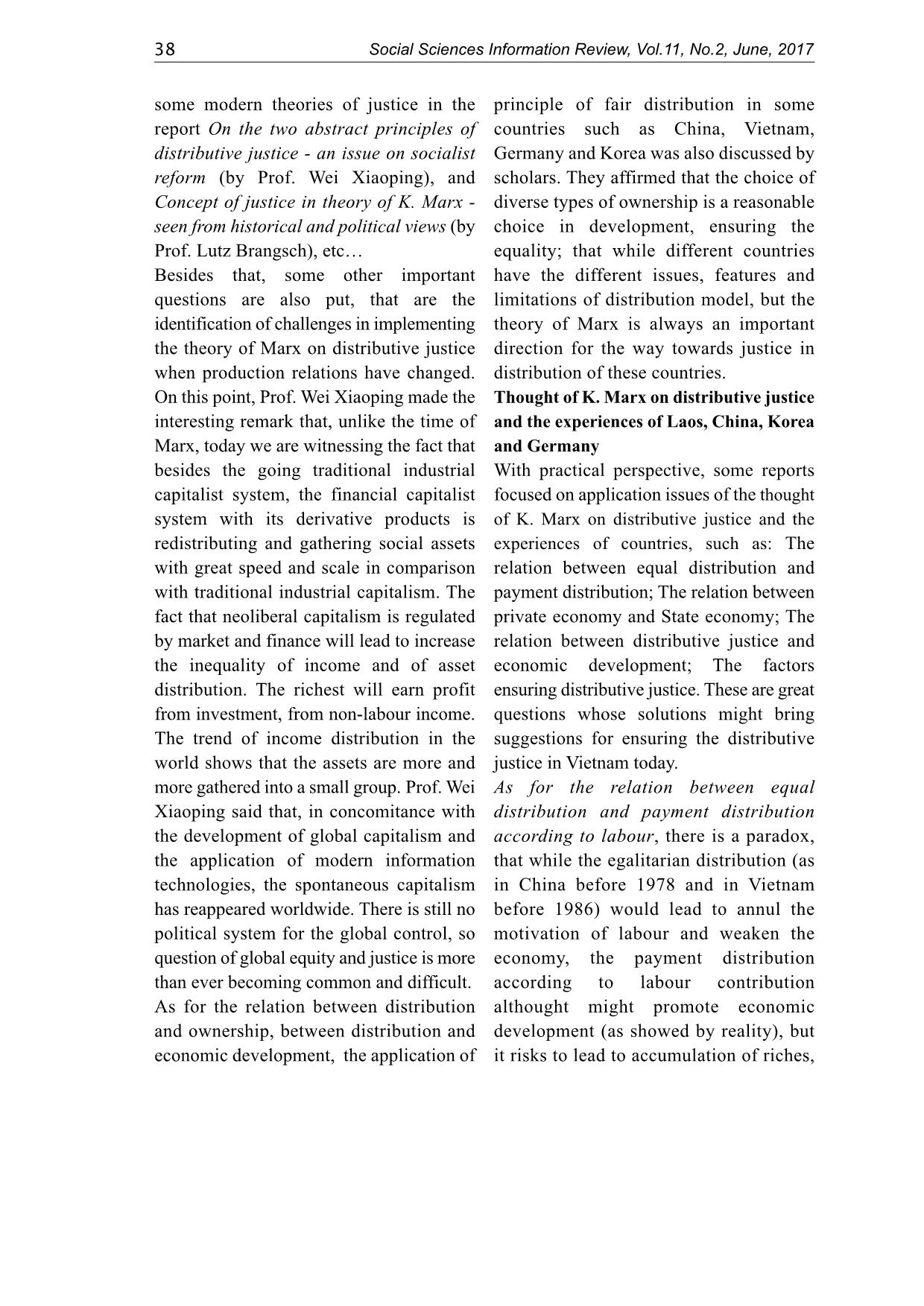
Trang 3
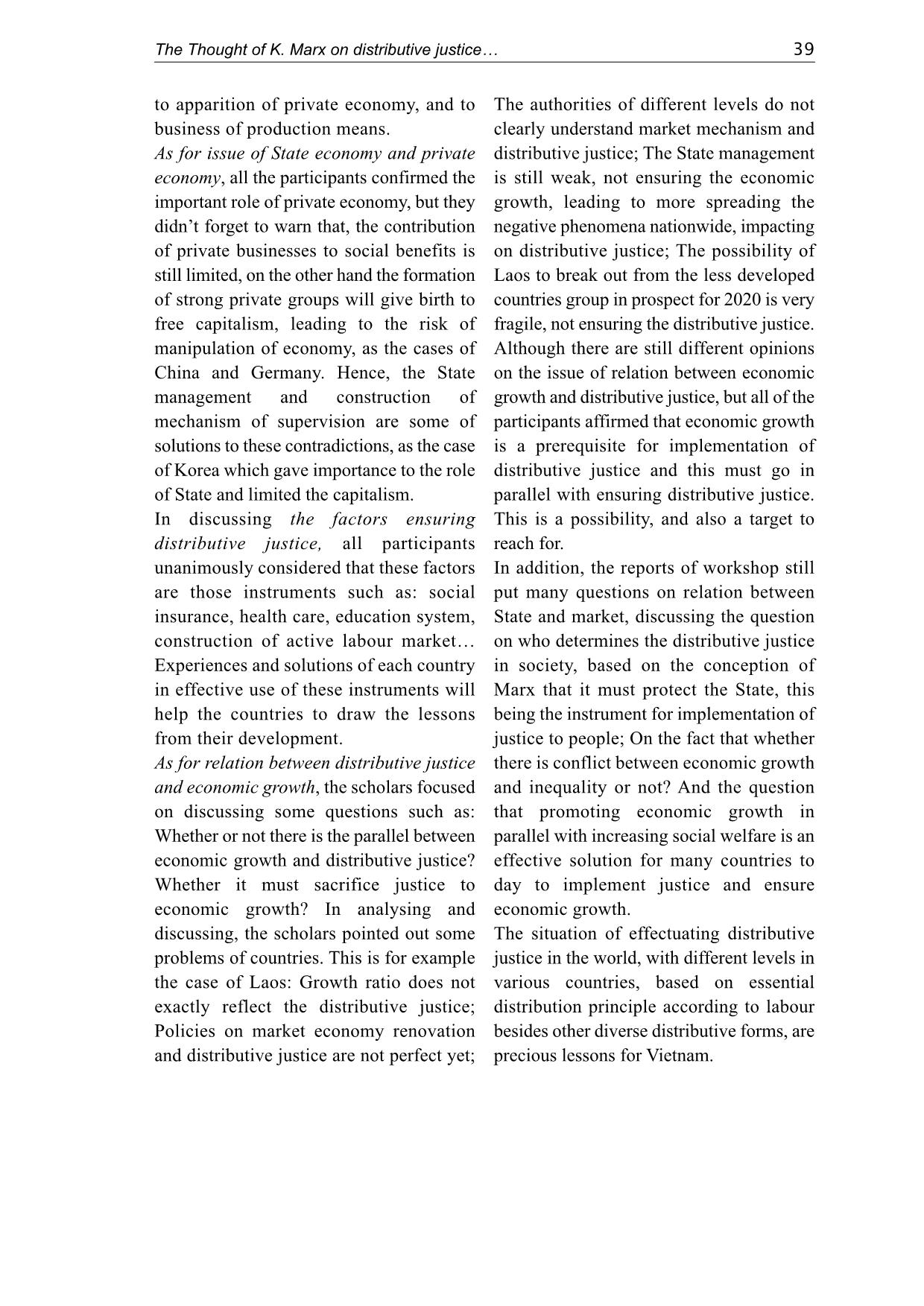
Trang 4
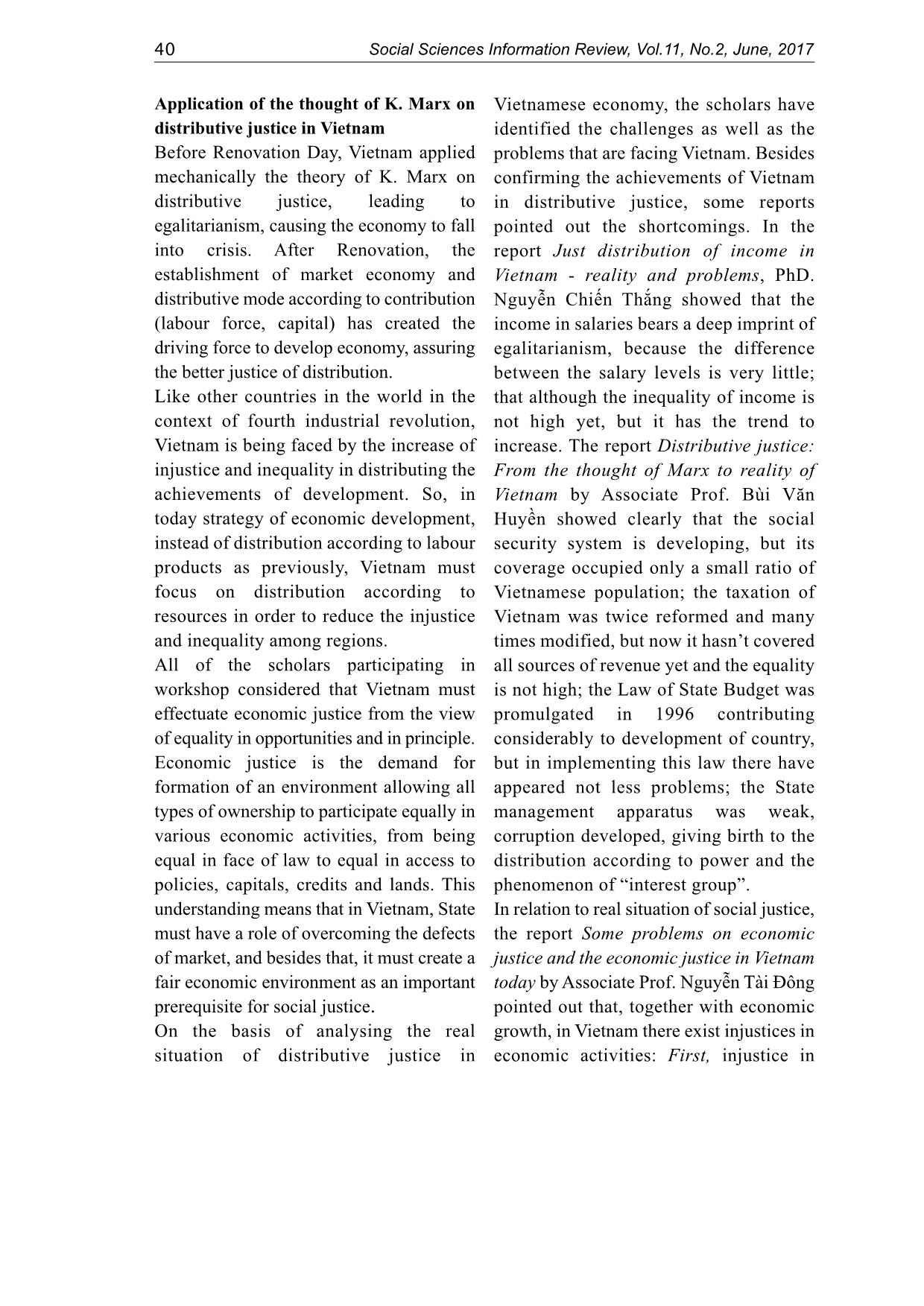
Trang 5
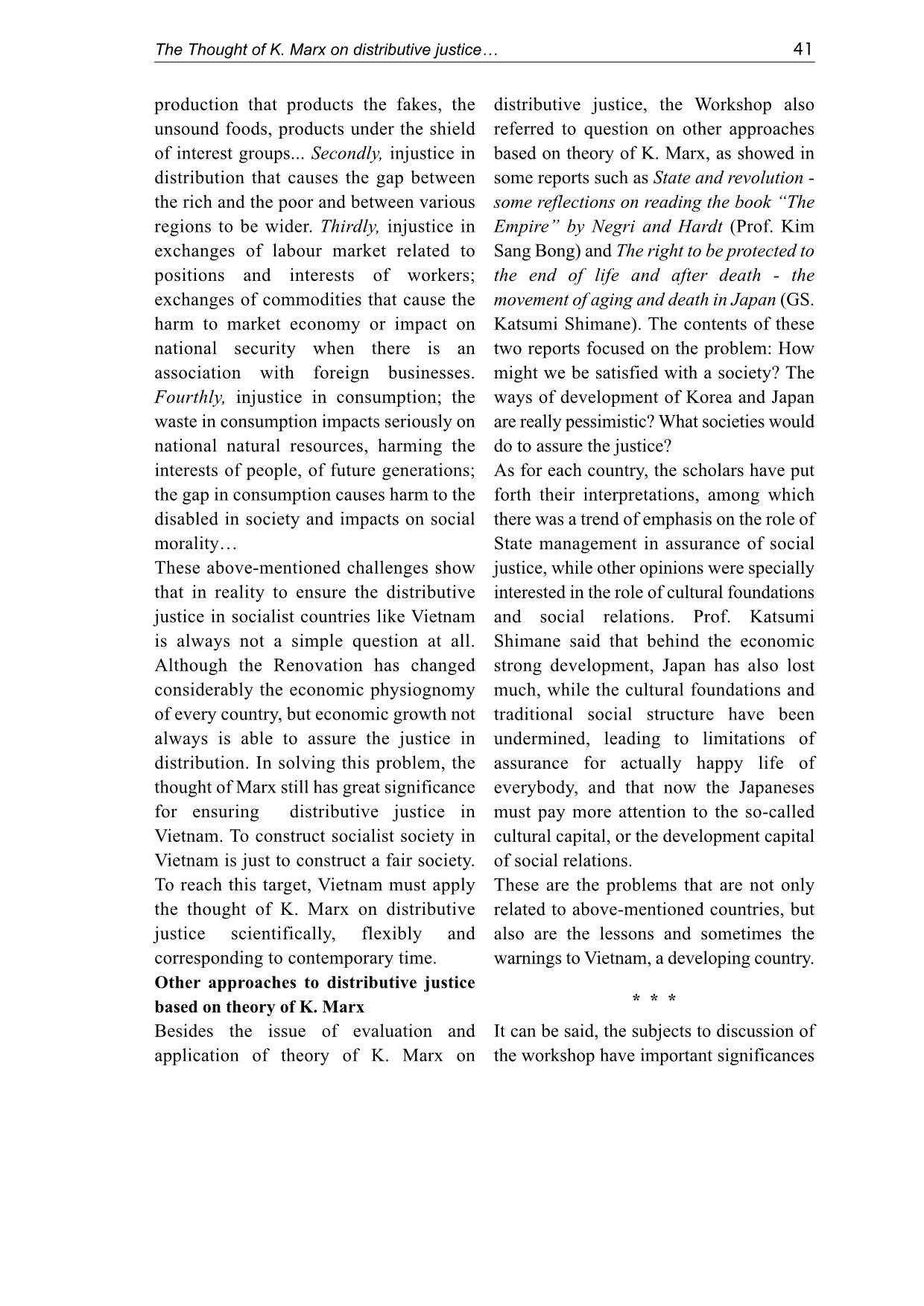
Trang 6
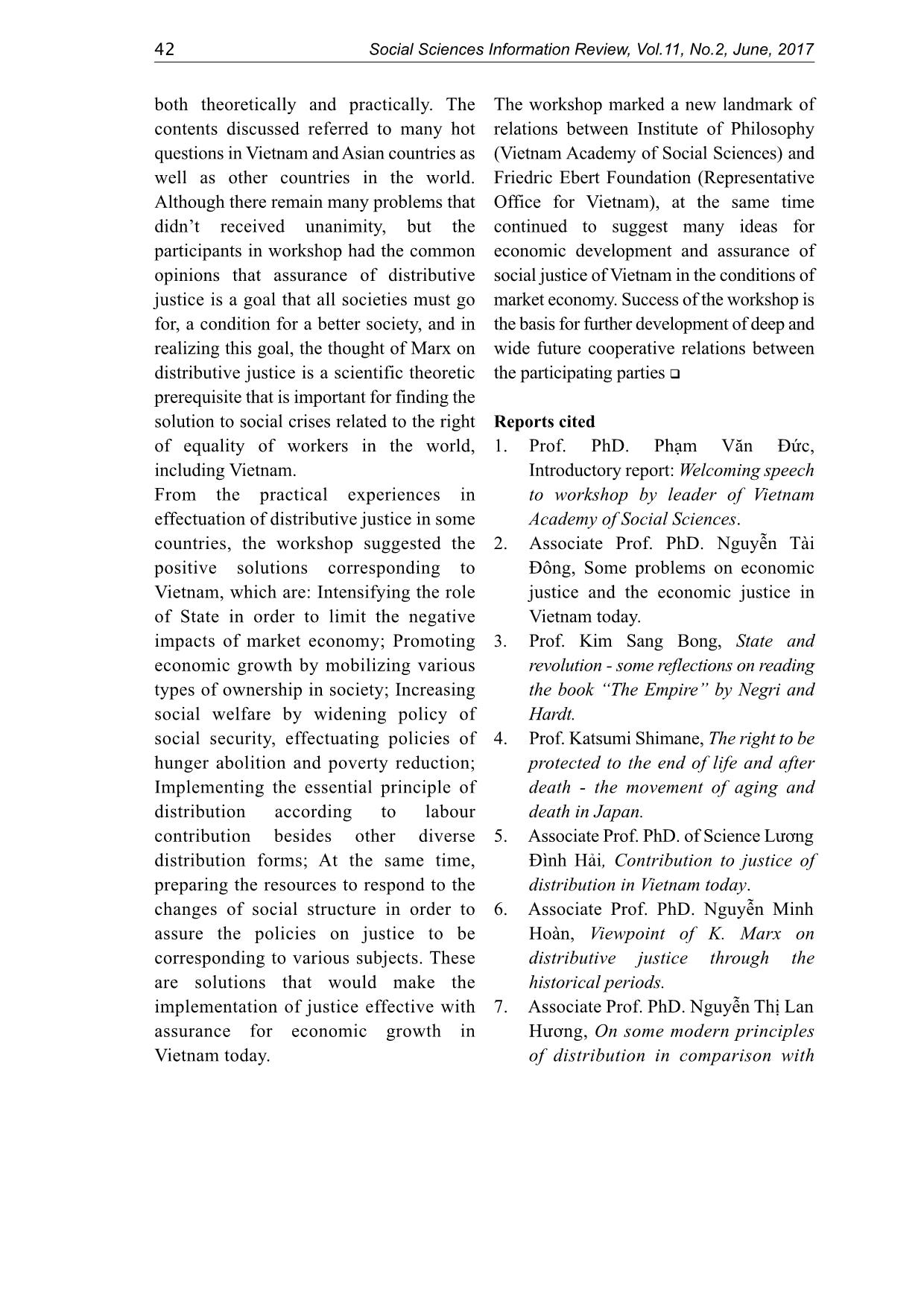
Trang 7
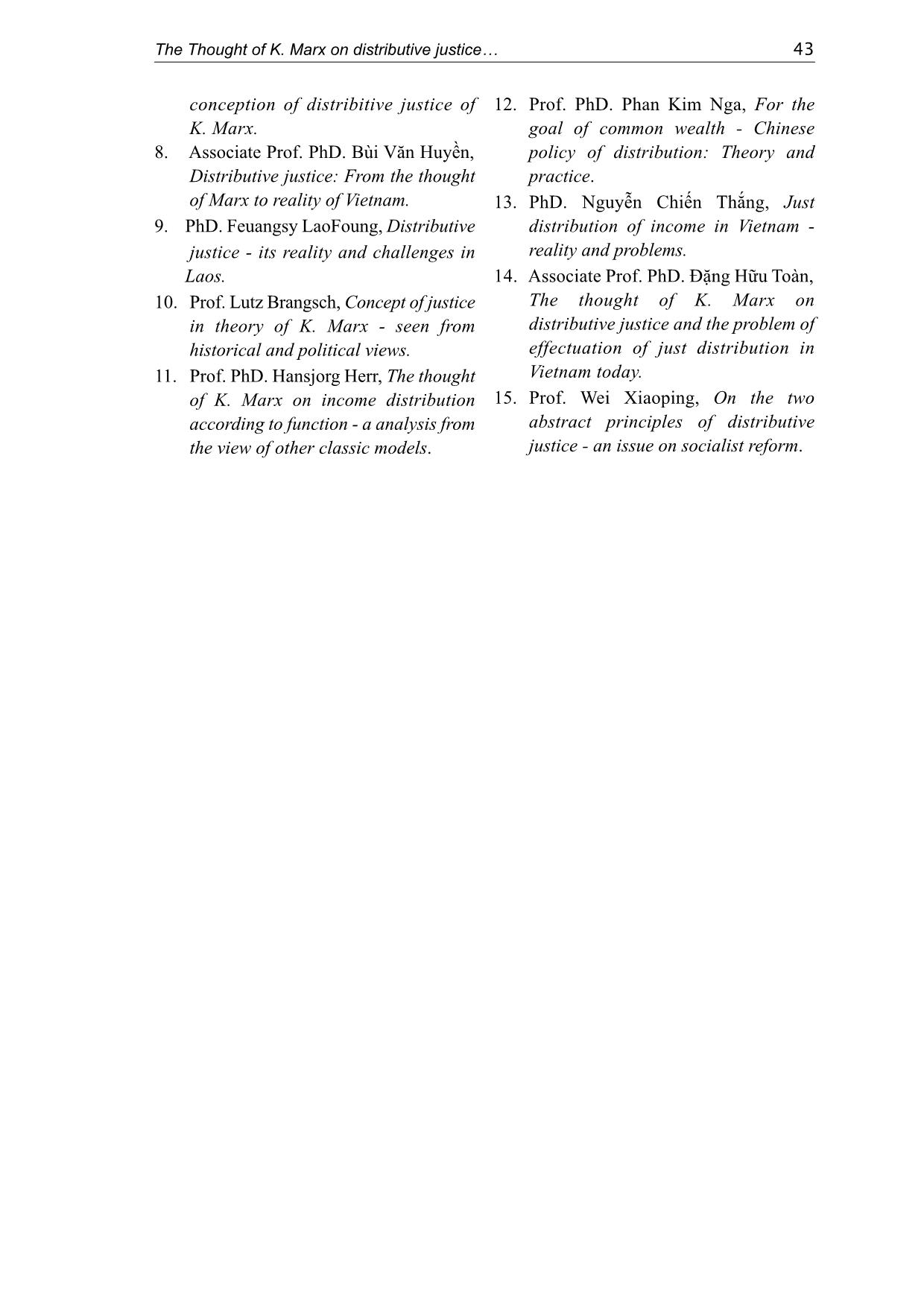
Trang 8
Tóm tắt nội dung tài liệu: Essential results of international scientific workshop: The thought of K. Marx on distributive justice and its present significances
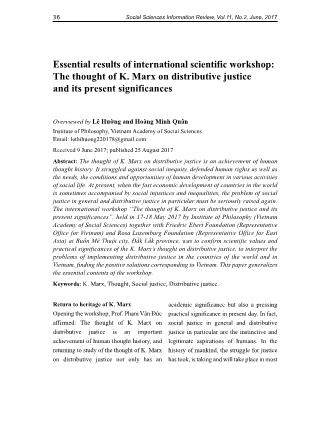
ts focused on application issues of the thought of K. Marx on distributive justice and the experiences of countries, such as: The relation between equal distribution and payment distribution; The relation between private economy and State economy; The relation between distributive justice and economic development; The factors ensuring distributive justice. These are great questions whose solutions might bring suggestions for ensuring the distributive justice in Vietnam today. As for the relation between equal distribution and payment distribution according to labour, there is a paradox, that while the egalitarian distribution (as in China before 1978 and in Vietnam before 1986) would lead to annul the motivation of labour and weaken the economy, the payment distribution according to labour contribution althought might promote economic development (as showed by reality), but it risks to lead to accumulation of riches, 38 Social Sciences Information Review, Vol.11, No.2, June, 2017 The Thought of K. Marx on distributive justice 39 to apparition of private economy, and to business of production means. As for issue of State economy and private economy, all the participants confirmed the important role of private economy, but they didn’t forget to warn that, the contribution of private businesses to social benefits is still limited, on the other hand the formation of strong private groups will give birth to free capitalism, leading to the risk of manipulation of economy, as the cases of China and Germany. Hence, the State management and construction of mechanism of supervision are some of solutions to these contradictions, as the case of Korea which gave importance to the role of State and limited the capitalism. In discussing the factors ensuring distributive justice, all participants unanimously considered that these factors are those instruments such as: social insurance, health care, education system, construction of active labour market Experiences and solutions of each country in effective use of these instruments will help the countries to draw the lessons from their development. As for relation between distributive justice and economic growth, the scholars focused on discussing some questions such as: Whether or not there is the parallel between economic growth and distributive justice? Whether it must sacrifice justice to economic growth? In analysing and discussing, the scholars pointed out some problems of countries. This is for example the case of Laos: Growth ratio does not exactly reflect the distributive justice; Policies on market economy renovation and distributive justice are not perfect yet; The authorities of different levels do not clearly understand market mechanism and distributive justice; The State management is still weak, not ensuring the economic growth, leading to more spreading the negative phenomena nationwide, impacting on distributive justice; The possibility of Laos to break out from the less developed countries group in prospect for 2020 is very fragile, not ensuring the distributive justice. Although there are still different opinions on the issue of relation between economic growth and distributive justice, but all of the participants affirmed that economic growth is a prerequisite for implementation of distributive justice and this must go in parallel with ensuring distributive justice. This is a possibility, and also a target to reach for. In addition, the reports of workshop still put many questions on relation between State and market, discussing the question on who determines the distributive justice in society, based on the conception of Marx that it must protect the State, this being the instrument for implementation of justice to people; On the fact that whether there is conflict between economic growth and inequality or not? And the question that promoting economic growth in parallel with increasing social welfare is an effective solution for many countries to day to implement justice and ensure economic growth. The situation of effectuating distributive justice in the world, with different levels in various countries, based on essential distribution principle according to labour besides other diverse distributive forms, are precious lessons for Vietnam. Application of the thought of K. Marx on distributive justice in Vietnam Before Renovation Day, Vietnam applied mechanically the theory of K. Marx on distributive justice, leading to egalitarianism, causing the economy to fall into crisis. After Renovation, the establishment of market economy and distributive mode according to contribution (labour force, capital) has created the driving force to develop economy, assuring the better justice of distribution. Like other countries in the world in the context of fourth industrial revolution, Vietnam is being faced by the increase of injustice and inequality in distributing the achievements of development. So, in today strategy of economic development, instead of distribution according to labour products as previously, Vietnam must focus on distribution according to resources in order to reduce the injustice and inequality among regions. All of the scholars participating in workshop considered that Vietnam must effectuate economic justice from the view of equality in opportunities and in principle. Economic justice is the demand for formation of an environment allowing all types of ownership to participate equally in various economic activities, from being equal in face of law to equal in access to policies, capitals, credits and lands. This understanding means that in Vietnam, State must have a role of overcoming the defects of market, and besides that, it must create a fair economic environment as an important prerequisite for social justice. On the basis of analysing the real situation of distributive justice in Vietnamese economy, the scholars have identified the challenges as well as the problems that are facing Vietnam. Besides confirming the achievements of Vietnam in distributive justice, some reports pointed out the shortcomings. In the report Just distribution of income in Vietnam - reality and problems, PhD. Nguyễn Chiến Thắng showed that the income in salaries bears a deep imprint of egalitarianism, because the difference between the salary levels is very little; that although the inequality of income is not high yet, but it has the trend to increase. The report Distributive justice: From the thought of Marx to reality of Vietnam by Associate Prof. Bùi Văn Huyền showed clearly that the social security system is developing, but its coverage occupied only a small ratio of Vietnamese population; the taxation of Vietnam was twice reformed and many times modified, but now it hasn’t covered all sources of revenue yet and the equality is not high; the Law of State Budget was promulgated in 1996 contributing considerably to development of country, but in implementing this law there have appeared not less problems; the State management apparatus was weak, corruption developed, giving birth to the distribution according to power and the phenomenon of “interest group”. In relation to real situation of social justice, the report Some problems on economic justice and the economic justice in Vietnam today by Associate Prof. Nguyễn Tài Đông pointed out that, together with economic growth, in Vietnam there exist injustices in economic activities: First, injustice in 40 Social Sciences Information Review, Vol.11, No.2, June, 2017 The Thought of K. Marx on distributive justice 41 production that products the fakes, the unsound foods, products under the shield of interest groups... Secondly, injustice in distribution that causes the gap between the rich and the poor and between various regions to be wider. Thirdly, injustice in exchanges of labour market related to positions and interests of workers; exchanges of commodities that cause the harm to market economy or impact on national security when there is an association with foreign businesses. Fourthly, injustice in consumption; the waste in consumption impacts seriously on national natural resources, harming the interests of people, of future generations; the gap in consumption causes harm to the disabled in society and impacts on social morality These above-mentioned challenges show that in reality to ensure the distributive justice in socialist countries like Vietnam is always not a simple question at all. Although the Renovation has changed considerably the economic physiognomy of every country, but economic growth not always is able to assure the justice in distribution. In solving this problem, the thought of Marx still has great significance for ensuring distributive justice in Vietnam. To construct socialist society in Vietnam is just to construct a fair society. To reach this target, Vietnam must apply the thought of K. Marx on distributive justice scientifically, flexibly and corresponding to contemporary time. Other approaches to distributive justice based on theory of K. Marx Besides the issue of evaluation and application of theory of K. Marx on distributive justice, the Workshop also referred to question on other approaches based on theory of K. Marx, as showed in some reports such as State and revolution - some reflections on reading the book “The Empire” by Negri and Hardt (Prof. Kim Sang Bong) and The right to be protected to the end of life and after death - the movement of aging and death in Japan (GS. Katsumi Shimane). The contents of these two reports focused on the problem: How might we be satisfied with a society? The ways of development of Korea and Japan are really pessimistic? What societies would do to assure the justice? As for each country, the scholars have put forth their interpretations, among which there was a trend of emphasis on the role of State management in assurance of social justice, while other opinions were specially interested in the role of cultural foundations and social relations. Prof. Katsumi Shimane said that behind the economic strong development, Japan has also lost much, while the cultural foundations and traditional social structure have been undermined, leading to limitations of assurance for actually happy life of everybody, and that now the Japaneses must pay more attention to the so-called cultural capital, or the development capital of social relations. These are the problems that are not only related to above-mentioned countries, but also are the lessons and sometimes the warnings to Vietnam, a developing country. * * * It can be said, the subjects to discussion of the workshop have important significances both theoretically and practically. The contents discussed referred to many hot questions in Vietnam and Asian countries as well as other countries in the world. Although there remain many problems that didn’t received unanimity, but the participants in workshop had the common opinions that assurance of distributive justice is a goal that all societies must go for, a condition for a better society, and in realizing this goal, the thought of Marx on distributive justice is a scientific theoretic prerequisite that is important for finding the solution to social crises related to the right of equality of workers in the world, including Vietnam. From the practical experiences in effectuation of distributive justice in some countries, the workshop suggested the positive solutions corresponding to Vietnam, which are: Intensifying the role of State in order to limit the negative impacts of market economy; Promoting economic growth by mobilizing various types of ownership in society; Increasing social welfare by widening policy of social security, effectuating policies of hunger abolition and poverty reduction; Implementing the essential principle of distribution according to labour contribution besides other diverse distribution forms; At the same time, preparing the resources to respond to the changes of social structure in order to assure the policies on justice to be corresponding to various subjects. These are solutions that would make the implementation of justice effective with assurance for economic growth in Vietnam today. The workshop marked a new landmark of relations between Institute of Philosophy (Vietnam Academy of Social Sciences) and Friedric Ebert Foundation (Representative Office for Vietnam), at the same time continued to suggest many ideas for economic development and assurance of social justice of Vietnam in the conditions of market economy. Success of the workshop is the basis for further development of deep and wide future cooperative relations between the participating parties Reports cited 1. Prof. PhD. Phạm Văn Đức, Introductory report: Welcoming speech to workshop by leader of Vietnam Academy of Social Sciences. 2. Associate Prof. PhD. Nguyễn Tài Đông, Some problems on economic justice and the economic justice in Vietnam today. 3. Prof. Kim Sang Bong, State and revolution - some reflections on reading the book “The Empire” by Negri and Hardt. 4. Prof. Katsumi Shimane, The right to be protected to the end of life and after death - the movement of aging and death in Japan. 5. Associate Prof. PhD. of Science Lương Đình Hải, Contribution to justice of distribution in Vietnam today. 6. Associate Prof. PhD. Nguyễn Minh Hoàn, Viewpoint of K. Marx on distributive justice through the historical periods. 7. Associate Prof. PhD. Nguyễn Thị Lan Hương, On some modern principles of distribution in comparison with 42 Social Sciences Information Review, Vol.11, No.2, June, 2017 The Thought of K. Marx on distributive justice 43 conception of distribitive justice of K. Marx. 8. Associate Prof. PhD. Bùi Văn Huyền, Distributive justice: From the thought of Marx to reality of Vietnam. 9. PhD. Feuangsy LaoFoung, Distributive justice - its reality and challenges in Laos. 10. Prof. Lutz Brangsch, Concept of justice in theory of K. Marx - seen from historical and political views. 11. Prof. PhD. Hansjorg Herr, The thought of K. Marx on income distribution according to function - a analysis from the view of other classic models. 12. Prof. PhD. Phan Kim Nga, For the goal of common wealth - Chinese policy of distribution: Theory and practice. 13. PhD. Nguyễn Chiến Thắng, Just distribution of income in Vietnam - reality and problems. 14. Associate Prof. PhD. Đặng Hữu Toàn, The thought of K. Marx on distributive justice and the problem of effectuation of just distribution in Vietnam today. 15. Prof. Wei Xiaoping, On the two abstract principles of distributive justice - an issue on socialist reform.
File đính kèm:
 essential_results_of_international_scientific_workshop_the_t.pdf
essential_results_of_international_scientific_workshop_the_t.pdf

